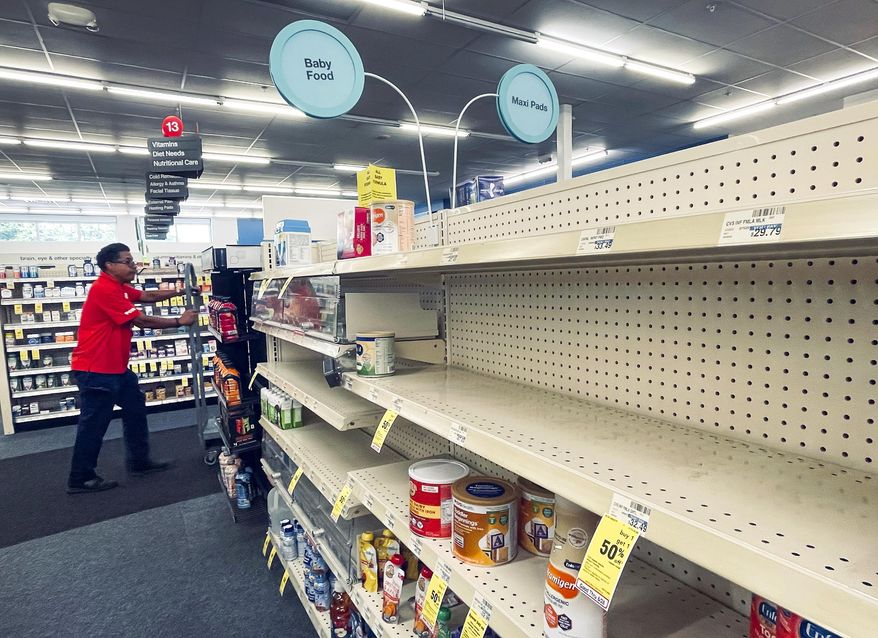In a market economy, persistent shortages of goods and services are not supposed to occur, unlike in socialist economies. In free markets, if demand begins to exceed the supply for something, producers will raise prices until the point where supply and demand are in equilibrium. The higher prices serve to motivate sellers to produce more, and to allocate scarce resources to avoid shortages. There can be temporary supply shocks, where a critical raw material becomes scarce because of a flood, drought, earthquake, war or what have you. But normally producers quickly adjust and find ways to meet demand.
How then can we have persistent shortages in toilet paper — a product invented more than 150 years ago — when there is no shortage of trees? Insulin was invented a century ago and is critical for the world’s 537 million diabetics (37 million in the U.S. alone), and the price has been soaring and now costs 10 times more in the U.S. than in any other developed country. The world, and particularly the U.S., is awash with oil and gas, yet prices have tripled in the last couple of years and are at record highs. There has been a global shortage of semiconductor chips — particularly, high-end chips. Baby formula — a product made for decades — is suddenly all but unobtainable in many places.
In communist and socialist countries, production decisions are made by state bureaucrats, who often make incorrect forecasts, resulting in shortages of things people need and want and surpluses of things for which there is little demand.
In a market economy, a lack of competition — too few competitors or competitors that collude with each other — can lead to higher prices and less innovation. This is why monopolies, and many organized collusive oligopolies, are often deemed illegal. A large body of “antitrust” law has developed to deal with the perceived problem. The government antitrusters have often missed the mark by attacking companies that posed little or no danger, while totally missing real dangers to the system.
Decades ago, when I took my first course in antitrust, the big fear was that GM would monopolize the auto industry. (That was just before many foreign auto companies opened plants in the U.S., almost destroying Detroit.) Another fear was that IBM would monopolize the computer industry — just before more innovative companies like Apple, Microsoft and Intel almost drove IBM into bankruptcy. And then there was the worry that U.S. Steel (a company few are aware even exists) would monopolize the steel industry.
Government is all too often responsible for the lack of competition in many industries because of regulations, patent and other intellectual property provisions, trade agreements and subsidies, and political attacks on the industry.
President Biden, before being elected, said he was going to shut down the oil, gas and coal industries for environmental reasons. He then appointed many people to his administration who are very hostile to the industry and are issuing endless costly rules, not only on production but also on the refiners, distributors and oil transporters. Given the situation, it should be no surprise that there is less new investment in the oil and gas industry, and prices have soared.
Mr. Biden likes to blame Russian President Vladimir Putin for the high prices, but the Russians are producing huge amounts of oil, while loving the high prices that Mr. Biden’s policies have caused. Mr. Biden is enriching the Saudis and the Russians while impoverishing American consumers. His policies cause more dirty oil to be produced by foreign countries at the expense of cleaner American oil. It is hard to be more wrong and mean-spirited than that.
Much of the pharmaceutical industry has produced off-shore for decades, putting U.S. consumers at risk from potentially hostile foreign actors like China. For many drugs, there are only a very few producers — often because existing patent holders have found legal ways of extending their intellectual property protections for even decades. Global insulin production has been almost entirely controlled by three companies — Novo Nordisk (Denmark), Lilly (USA) and Sanofi (France). In March 2021, the U.S. FDA introduced an interchangeability regulation that is easing market entry for other companies.
West Virginia has had an acute problem with diabetes, where 16% of the adult population is suffering from it. The average gross cost of insulin last year in the U.S. was $6,459 per patient, which hits a poor state like West Virginia particularly hard. Last week, there was very good news when UNDBIO, a South Korean company, announced it was launching a facility for producing insulin in West Virginia. The state of West Virginia is supporting the effort with tax and other incentives, which is expected to create 1,200 new jobs in Morgantown.
Subsidizing the creation of new competitors is less than an ideal solution, but far superior to the Biden administration’s proposals for price controls. Price controls almost always lead to shortages, black markets and corruption.
Behind almost every shortage and price spike is some bungled government policy. Other than less government regulation in general, there is no simple solution other than to take on each market impediment one by one. The solutions to all of the shortages listed are known. It is not rocket science — it is common sense.
• Richard W. Rahn is chairman of the Institute for Global Economic Growth and MCon LLC.
https://www.washingtontimes.com/news/2022/jun/13/behind-almost-every-shortage-and-price-spike-is-a-/
© Copyright 2022 The Washington Times, LLC.
